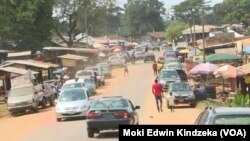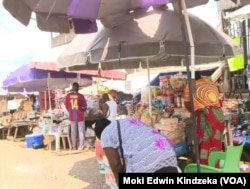Cameroon has reopened its southwestern border with Nigeria after closing it about a year ago because of conflicts between Cameroon's military and armed separatists fighting to create an English-speaking state.
A senior official from Cameroon's military asks the people of Ekok village on the southwestern border with Nigeria to consider the soldiers as friends who are there to protect them.
Cameroon businessman Christopher Efiom, 46, buys food from Cameroon and takes it to Nigeria where it is sold. When he is returning from Nigeria, he buys spare motor parts and sells them in Cameroon. He says the presence of the military in the border market has chased fighters to the bushes and across the border to Nigeria. He says that for a month now, merchants have been able to do business despite ongoing fighting between the military and the separatists.
"There are days that the military goes down to attack the boys [fighters] and when they go down, there is serious gun shooting," Efiom said. "So many casualties are on the field. The Amba fighters usually block us on the way and you can never predict when they are there. There are days that even the military are unable to carry the convoy right to Nigeria."
"Amba" is the self-declared English-speaking region of Ambazonia, where armed separatists are fighting for independence.
Cameroon businessman Cletus Ndungang, 32, says although the military has reopened the border, business has yet to resume fully because most buyers and sellers still fear for their safety.
"Eighty percent of our rice is imported. It is very risky for a businessman to carry rice knowing that there is going to be a problem. Even maize. We also have oil, we have sugar. In fact, all the food, there is a problem because of this barbaric act. Most of the businessmen would not want to come in," he said.
When Cameroon declared war on the armed separatists in November 2017, it said gunmen were attacking border localities in Cameroon's southwest and escaping to Nigeria.
Nigeria denied the assailants were crossing over from its territory into Cameroon.
Bernard Okalia Bilai, governor of Cameroon's southwest region, says collaboration between the Nigerian and Cameroon militaries is bringing peace to the border areas and business is resuming; but, he says, civilians who sought to escape the fighting should look to the military as their partners in working toward peace.
The separatist insurgency gained momentum in 2017 following a government crackdown on peaceful protests by Anglophones, who complain of being marginalized by the French-speaking majority. Some political leaders have called on President Paul Biya to initiate dialogue with the separatists. But Biya — who has ruled Cameroon for 36 years — has refused any talks on Cameroon becoming a divided state.






